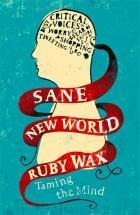What do you think?
Rate this book


256 pages, Paperback
First published June 1, 2013
I’ll go into detail later but I want to mention one fact right away; the gold at the end of the rainbow is that YOU CAN CHANGE YOUR MIND AND HOW YOU THINK. This is called neuroplasticity. Your genes, hormones, regions in the brain and early learning do not necessarily determine your fate.If you don't have even a slight sense of gallows humour about your depression, this is not a book for you.